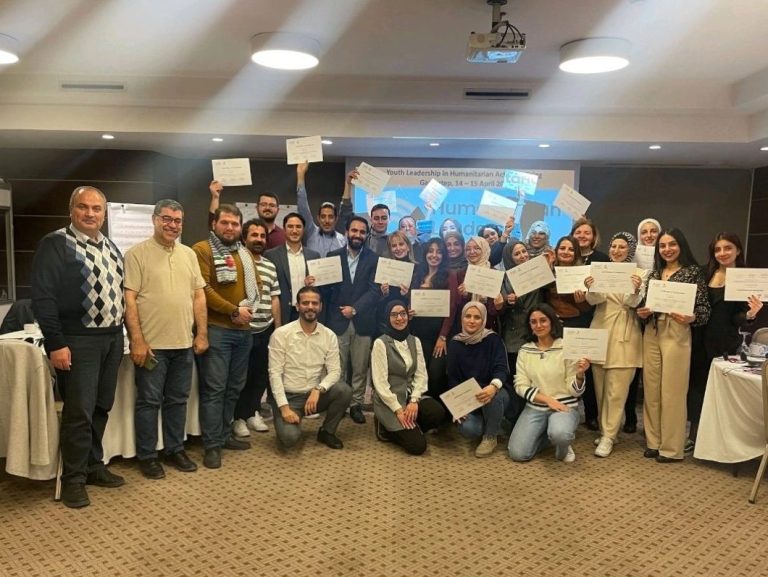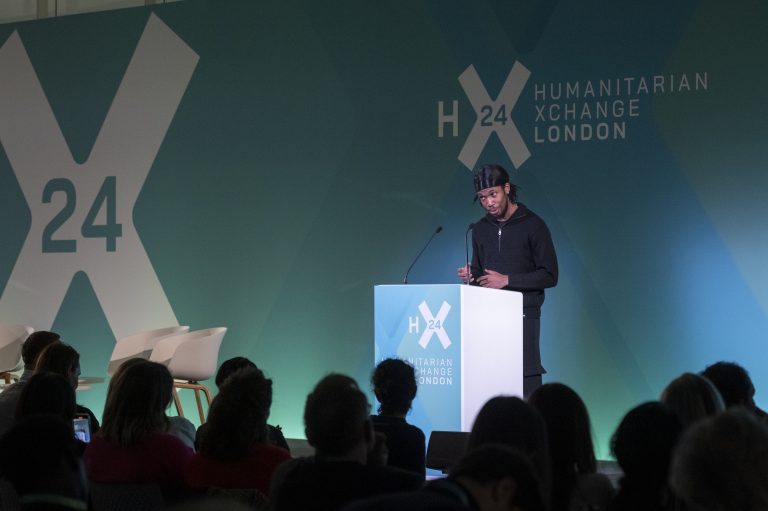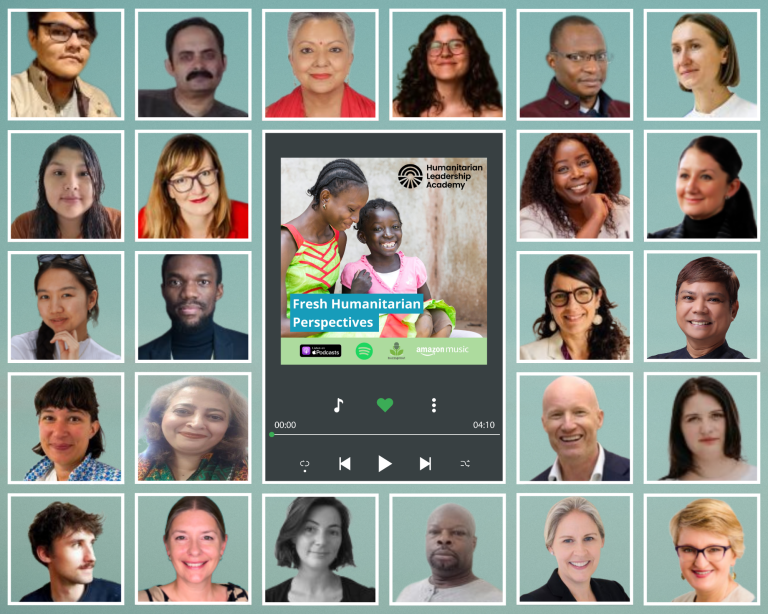The HLA’s Asia Pacific Regional Centre has successfully piloted an innovative approach to Education in Emergencies (EiE) training in Islamabad, adapting the flagship EiE Fundamentals programme for women in Pakistan.
In times of crisis, education is a lifeline to children and their families. EiE Fundamentals is a training programme delivered globally by the Humanitarian Leadership Academy, with the aim of equipping country office education and EiE staff with the fundamental competencies to be part of initiating, designing and implementing a quality EiE response in their context.
In Pakistan, the Education Working Group identified a crucial need to build a core group of women trainers who can deliver EiE training in areas of the country where only women trainers are allowed to teach or train women participants.
The HLA has developed an innovative twin training approach contextualised for Pakistan: the Women in EiE Fundamentals programme coupled with the Transformation of Training (ToT) programme, designed to build a pool of highly skilled facilitators who will be able to deliver quality humanitarian training.
This successful initial implementation is now paving the way for this initiative to be built on and developed further by the HLA across the Asia Pacific region.
Contextualised capacity strengthening training for Pakistan
Between 1-3 July 2024, 35 learners – 31 women and 4 men – convened in Islamabad to undertake the in-person training component of the programme.
Participants were drawn from a range of organisations including international NGOs – including Street Child and Save the Children – UN agencies, local/national organisations, and government agencies.
The Women in EiE Fundamentals Pakistan programme was carefully designed to support women EiE/education professionals working on project sites where they may face limited access to capacity strengthening support.
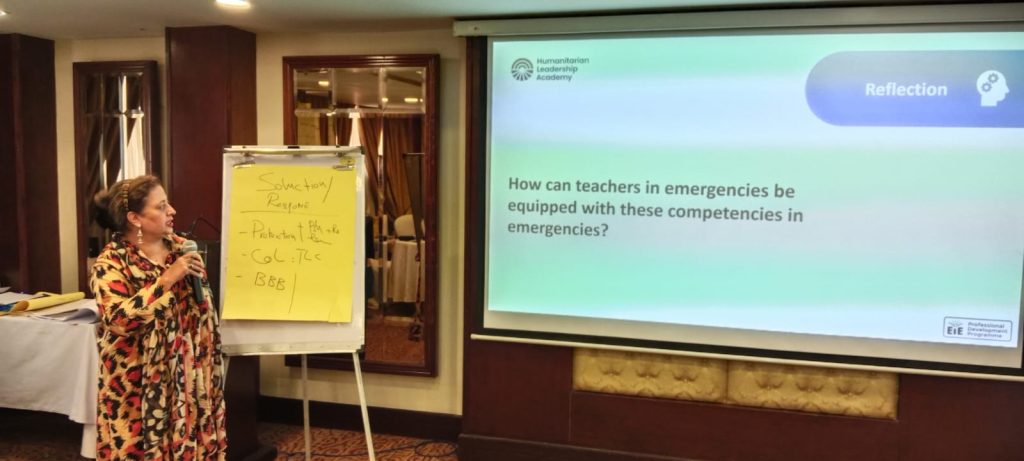
This condensed version of the standard EiE Fundamentals programme was delivered over a total of 24 hours by the HLA in partnership with Save the Children Pakistan and the Education Working Group (EWG).
Participants engaged in an activity-based learning through a country context case study, focusing on ‘learning by doing’ approach – with the aim of yielding impactful results within a limited time frame and resources.
Within this training we discussed a lot about localisation. When we say EiE, it means that local partners who are there in the field, on the ground. When an emergency hits, their capacity should be the best to react to that. So those strategies – I am very happy that we are going to develop further on it and improve it, so that more and more local partners are capable of being part of EiE.
The training was led by Efren Lubuguin – the HLA’s EiE Professional Development Programme Manager for Asia – together with co-facilitators Humaira Naseer from Save the Children Pakistan and Ehsan Ullah from UNICEF Pakistan. They were supported by Sehar Taimoor, Save the Children Pakistan’s Education Advisor and a current student on the EiE Certificate of Advanced Studies programme in Asia.
I appreciate this training module as well as the concept behind it. The training is about women in education in emergencies, and revolves around women, and I have learned a lot. This is something new for me in a way. It was a very targeted approach. I have improved my competencies in thinking about children, school, community overall, government regulations and the coordination between all these stakeholders.
Once the Women’s EiE training had concluded, 25 participants – 18 women and 7 men – undertook the Transformation of Training programme between 4-5 July. This aims to equip participants with skills, knowledge and confidence to deliver training in a humanitarian context, cascading their knowledge throughout the country.
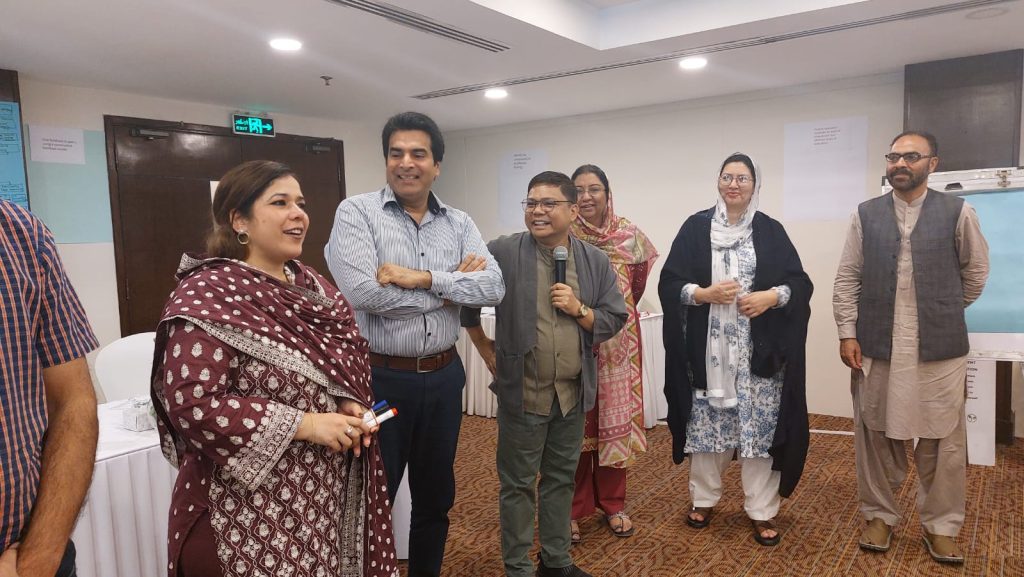
I’ll be using this training to plan a EiE workshop in Balochistan. So first of all, I’ll plan a training for at least two or three days for my staff and implementing partners so they are updated on the new skills and what I have learned – I will cascade that to my staff. [The training] has already improved my skills personally and professionally because I will be able to respond to emergencies and transfer my knowledge to others as well.
Inclusive and supportive training environment for women
It was at the launch of the initial launch of EiE Fundamentals programme in Islamabad in December 2023 – where one-third of participants were women – that the team recognised a need and opportunity to develop a contextualised version of the training designed specifically for women, and identified ways to adapt the existing provision.
In this Women’s EiE Fundamentals edition of the training, measures were taken to create an inclusive training environment in order to reduce potential barriers to female participation. For example, accommodation was provided to participants from outside of Islamabad, and three participants who are breastfeeding mothers were able to bring their children to the training venue.
In addition, a participant who has recently taken maternity leave highlighted the particular benefits of this training to her as a recent returnee to the workplace, helping to refresh her skills and knowledge.
I was on maternity leave for almost a year and I did not get a chance to renew my skills. We have regular emergencies in Balochistan and we have threat of new emergencies – flash floods in the upcoming monsoon season. It’s good for me to update my skills especially after long leave and also have tabs on what’s happening in EiE and how I can help in – god forbid – an emergency. This is very important and relevant to my job – as an EiE person I have to support my government counterparts, implementing partners and staff on how to respond to any emergencies, especially in education.
Training benefits and immediate impact
The participants shared some immediate benefits and positive impact of the training, with all reporting that they will be able to apply their new skills and knowledge in their work.
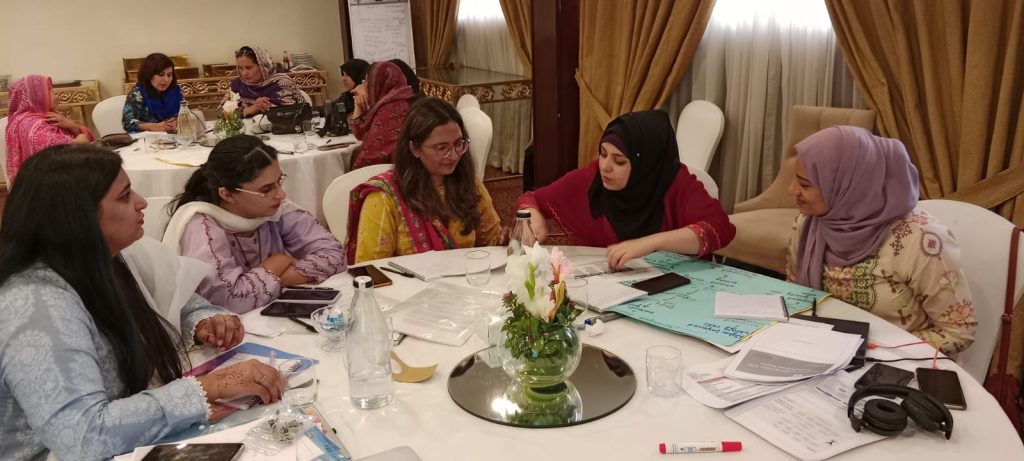
This training is very close to my work – the first step is that I will incorporate the EiE competencies in my manual, module and practices. I am planning to share all these training materials to the other education related projects in my organisation so I can support there.
As I have direct contact with teachers, especially with female teachers, assistant education officers and girl students, I think I can guide them, how to deal in such emergencies, especially regarding preparedness and how to respond properly. More importantly, I have learned that education is a very, very important thing to do an immediate response on. We usually get involved in life saving matters, of course this is very important, but education is not something to ignore at that time because early education suffers.
Participants also expressed increased confidence in taking leadership roles and acting as a role model to other women.
When I put myself in a leadership role to demonstrate the changes happening – when women are a part of planning, processing and implementation – the changes will happen. I think this approach will impact on females and girls around me, and communities as well.
From a gender perspective, it was good to see so many female participants as in Balochistan, it is rare to see any women working in EiE or in emergencies. So this has boosted my confidence. This is not only me who is working for emergencies, but there are other females as well.
On conclusion of this training, lead facilitator Efren Lubuguin from the HLA reflected:
“We were delighted to have this opportunity to develop the Women’s EiE training for Pakistan, launching two innovations of our EiE Fundamentals: reaching out to more women EiE professionals in the country with limited access to capacity building opportunities, building women’s capacities and unleashing women’s power in transforming EiE sector strategies.
In addition, this is the first time conducting an EiE Transformation of Training in the region, and I see the value of implementing this immediately after EiE Fundamentals course. ToT is a fitting complementary course to the Fundamentals essential to the rolling-out activities within the sector.”
Co-facilitator Ehsan Ullah from UNICEF said:
“Pakistan Education Sector Working Group (ESWG) on EiE is committed to take gender mainstreaming and transformation as key priority Education in Education preparedness response planning. I see this training as key to equip ESWG women to better support EiE response at affected areas.”
Insights from facilitators and participants will be shared in an upcoming HLA podcast episode, offering a deeper look into the training and its impact as well as future plans.
Looking to the future
The Education Working Group will continue its collaboration to develop follow-up activities including establishing a Community of Practice EiE Fundamentals with programme graduates.
The HLA Asia EiE Regional Development Manager is set to embark on an in-person EiE Fundamentals training programme in the Pacific Islands, delivering in-person training in Papua New Guinea, Solomon Islands, Vanuatu and Tonga. The training will follow this condensed format successfully piloted in Islamabad and will be contextualised for the Pacific Islands, utilising a ‘learning by doing approach’ with case studies focusing on climate induced emergencies.
The HLA Asia Regional Centre congratulates all participants in this programme and extends thanks to Save the Children Pakistan, UNICEF, and the Education Working Group, as well as the Ministry of Education.
Insights from facilitators and participants will be shared in an upcoming HLA podcast episode and case studies, offering a deeper look into the training’s outcomes, impact and plans for the future.
Find out more
Education in Emergencies Professional Development Programme
Education in Emergencies (EiE) – Humanitarian Leadership Academy
Education in Emergencies Online – free online course on Kaya available in English, French, Spanish, Arabic, Ukrainian and Polish
HLA Asia Regional Centre
Asia – Humanitarian Leadership Academy
